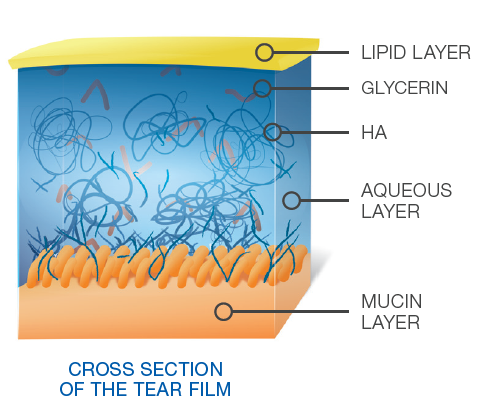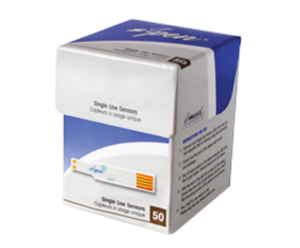Dry eye complaints are something both our optometrists, Dr. John Wilson and Dr. Euan McGinty are seeing more and more of in their day to day consultations.
With people spending more time doing visually intensive tasks, working on computer screens for extended periods and working in environments with controlled atmospheres which are often dry, it is perhaps not surprising that it is becoming an increasingly common complaint.
Therefore, we decided to quiz our doctors a little further about dry eyes.
"While the symptoms of dry eyes can be very frustrating", John says, "the clinical issues associated with it can be equally significant. A dry eye can often be a compromised eye and therefore more vulnerable to infections or even scar tissue formation. These both can further complicate the picture and early intervention to provide long term management really is key."
"If you suffer from dry eyes, which can often be recognised through its signs and symptoms, then it is important to have it properly assessed so that we can give you the correct advice specific to your condition."
"This is important", Euan adds, "not all dry eyes are the same. From that point of view we often have people whose symptoms can range from a burning/gritty sensation, an itchy sensation, to just some discomfort. What is surprising is we also have patients whose eyes are watering, they can find it strange when we start to talk about 'dry eyes'."
"Looking at the eyes, patients can present with red eyes or inflammation of the tissues of the eye and eyelids, at other times the eye looks quiet and healthy, but the symptoms are all there. From this point of view dry eyes can be an incorrect label, really we are talking about the tear film not functioning properly."
"When we are performing a dry eye assessment we will be looking at all of these factors, taking into account the symptoms, the appearance of the eye and the tear film and the quality and quantity of tears present. This will help us to arrive at a care plan which is individual and appropriate for each patient."
"I can't agree more", adds John. "This really isn't a one-size-fits-all type condition. With an appropriate manage plan, the condition can often be turned completely around. It does take effort and commitment from both the patient and ourselves, especially in the early days and weeks. When we review patients and compare their initial metrics to those after appropriate management, the improvements can be marked."
"This can translate into real world differences, not just in their comfort, but also in their quality of vision."
We asked, is there any general advice which could be helpful?
Euan replied, "It's hard to be general, but there are some things which I do keep going back to.

Firstly, not all artificial tears are the same. It is important to find one which works well for you, although I would say that preservative free artificial tears are generally all better than others."
"There may be an element of trial and error to begin with, however, my go-to artificial tear at the moment is one called "Hylo". This contains an excellent agent for nourishing and protecting the eye, Sodium Hyaluronate, which is found naturally in the tear film. It comes in unique bottle allowing it to be both preservative free and usable for up to six months from first opening."
We have found this to be so successful we have decided to stock it in our office to make it easier to find, it is available at pharmacies and drug stores, however, some patients did comment that it was difficult to find.
As Hylo is preservative free it is also suitable for contact lens wearers to use, even with their contact lenses in. So if you find that your contact lenses dry out your eyes or have difficulty in handling your lenses at the end of the day, this may just be the solution you are looking for.
"There are two things I keep coming back to as well," responds John, "Omega-3 fish oils and an eye mask"
 |
| Dr. John Wilson using a Thera Pearl Eye Mask |
"The Omega-3 supplements have been shown to be useful in helping manage dry eye conditions, it is important to choose the fish oil, however, and not the flax seed oil (which may have other benefits). There are certain things to look for, so a little research is definitely useful to ensure it will fit in with your needs and lifestyle."
"Eye masks are a great resource for patients with dry eyes. We recommend the Thera Pearl eye mask and again have decided to always have it available here at Ocean, as we were so impressed. It can be used for both warm compresses, to help open up the meibomian glands and improve their function, and cold compresses, to help calm down an angry and inflamed eye. I have been so impressed with this simple product that I have one at home for myself to use!"
John concludes, "While this advice may not be for every patient, it may be beneficial for many patients and, at times, I do wonder if we should all be performing eye-lid cleaning and warm compresses as part of our daily routine, like brushing and flossing our teeth."
One final piece of advice from both or our optometrists: Don't forget the
20/
20/
20 rule - for every
20 minutes you are using your computer (or tablet/smartphone) you need to look at something
20 feet away for at least
20 seconds.
If you have any concerns about dry eye, please feel free to make an appointment. The first step is a comprehensive eye examination to rule out other factors and then, if appropriate, we can schedule a dry eye assessment appointment.









